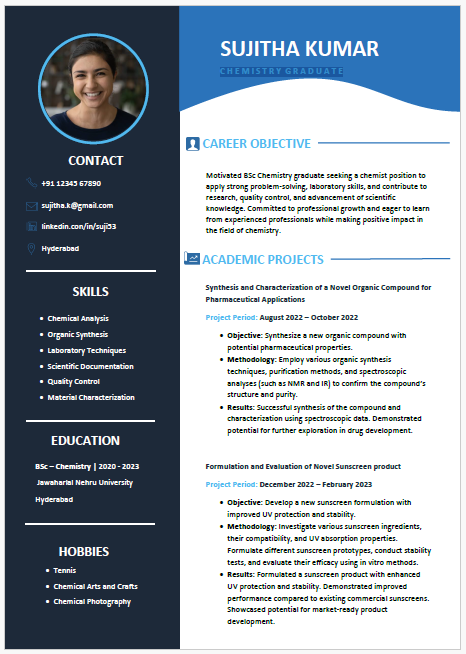Chemist
BSc – Chemistry

About this template
Resume is often the first impression candidate make on potential employers.
This is a well-designed resume template which can help you stand out from the competition and showcase your qualifications in a clear, professional manner.
Some Important and most common Interview question for entry level chemist
Here are some important and common interview questions for entry-level chemists, along with suggested answers :
1. What inspired you to pursue a career in chemistry?
My interest in chemistry began in high school when I was fascinated by the way chemical reactions could create new substances and solve real-world problems. This passion continued through my college education, where I enjoyed conducting experiments and learning about various chemical processes.
2. Can you describe your experience with laboratory equipment and techniques?
During my studies, I gained hands-on experience with a range of laboratory equipment such as spectrophotometers, chromatographs, and titrators. I am proficient in techniques like titration, chromatography, and spectroscopy, which I used in various research projects and lab courses.
3. How do you ensure accuracy and precision in your experimental work?
Ensuring accuracy and precision is crucial in chemistry. I follow standardized procedures meticulously, calibrate instruments regularly, and maintain a clean and organized workspace. I also double-check measurements and calculations to minimize errors.
4. Describe a challenging experiment or project you worked on and how you handled it.
In one of my final year projects, I had to synthesize a complex organic compound. The reaction conditions were tricky, and initial attempts failed. I consulted literature, adjusted the parameters, and sought advice from my professor, ultimately succeeding through perseverance and critical thinking.
5. How do you stay updated with the latest developments in chemistry?
I stay updated by reading scientific journals like the Journal of the American Chemical Society and attending webinars and conferences. I also participate in online forums and follow industry news to keep abreast of new research and technological advancements.
6. What safety protocols do you follow in the lab?
Safety is paramount in the lab. I always wear appropriate personal protective equipment (PPE), follow proper chemical handling and storage procedures, and familiarize myself with the Material Safety Data Sheets (MSDS) for all chemicals used. I also ensure proper waste disposal and emergency procedures.
7. How do you handle repetitive tasks and ensure consistency in your work?
Repetitive tasks require focus and discipline. I use checklists to ensure all steps are followed consistently and take regular breaks to maintain concentration. I also document procedures and results meticulously to track any variations and ensure reproducibility.
8. Can you explain a time when you had to troubleshoot an issue during an experiment?
Once, I encountered unexpected results in a titration experiment. After reviewing my steps, I realized the indicator was not fresh. I replaced the indicator, repeated the experiment, and obtained the correct results. This taught me the importance of verifying the quality of reagents.
9. How do you approach teamwork and collaboration in a lab setting?
Teamwork is essential in the lab. I believe in clear communication, sharing responsibilities, and respecting others' expertise. I actively participate in group discussions, provide support when needed, and am open to feedback to improve our collective work.
10. What are your long-term career goals as a chemist?
My long-term goal is to contribute to meaningful research and development in the field of chemistry, possibly focusing on pharmaceuticals or environmental chemistry. I aim to continue learning and growing professionally, ultimately leading projects and mentoring junior chemists.